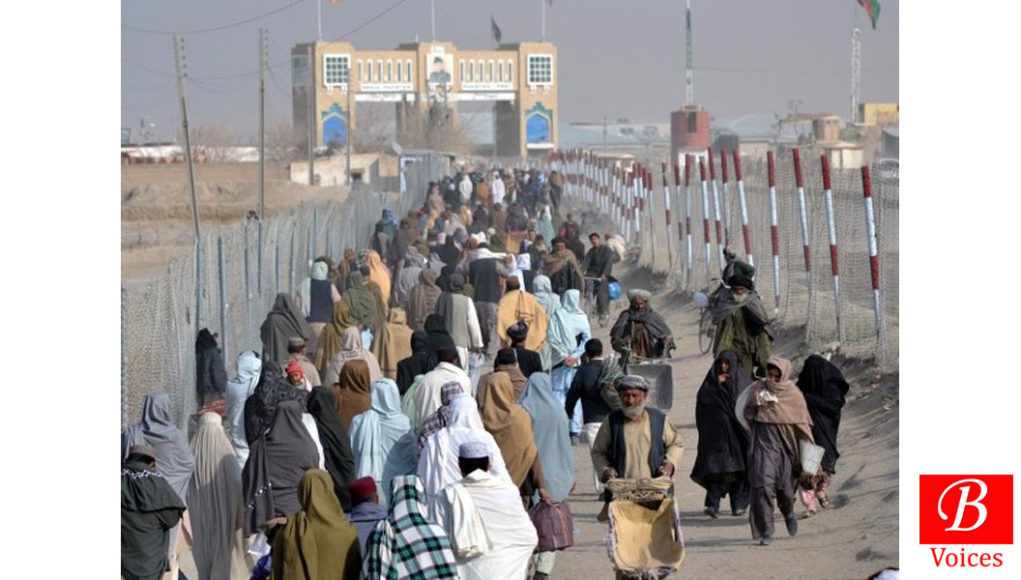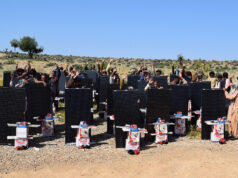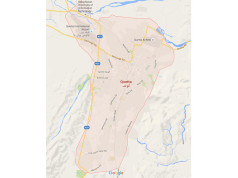Obaida
August 15, 2021, was a nightmare for thousands of Afghans, and a day when the Taliban occupied Afghanistan for the second time in history, caused a big chunk of Afghans to flee the country. Thousands of Afghans have been crossing Chaman and Torkham border to pursue refuge in Pakistan.
Among them is Suraya, 35, a resident of Kunduz Province, the northern part of Afghanistan, who fled the country when the Taliban seized control of Afghanistan.
“There was an intense war in Kunduz, our house was bombarded. Many houses and shops were put on fire. We fled Afghanistan to save our lives,” said Suraya, who left Afghanistan with her family from the Chaman border-crossing the day after the Afghan government fell under the Taliban regime.
Read also: World Refugee Day Celebrated in Quetta
“I am a patient having hepatitis and cardiac issues. My husband is also going through an illness. So far, we have received no aid from the government or United Nations. Our children are dying. We request the government of Pakistan and UN agency to aid us,” Suraya said.
Soviet-Afghan war 1979-1989 and Taliban occupation of Afghanistan 1996-2001, made millions of Afghans to seek shelter around the world. Since then, as per the UNHCR figures, over 1.4 million documented and approximately 1 million undocumented Afghan emigrants are living in Pakistan for the last 40 years.
“We cannot explain the agony we suffered when we left Mazar-e-Sharif to reach Kabul. We cannot express it in words. The condition was horrible. We had left everything behind to save our lives, but the situation in Kabul was even not good. We lived many days in a park without asylum and meal,” says a destitute parent and widow on the condition of anonymity.
According to the UNHCR report, because of the conflict this year, almost 700,000 Afghans have been displaced internally while thousands are still struggling to find a safe way to get out of the country.
“It took us four days to reach the border. The officials standing at the border did not let us cross. The situation at the border was worse. I had a small amount of money which I spent on rout-fair to reach there,” said the helpless parent who fled from Afghanistan. She is a mother of two daughters and four sons less than 18. “We do not have shelter to live in, water to drink, and bread to eat. My children are starving. Since we have come, no one has tried to help us. I request the government and the international community to help us,” she added while requesting the government.
The strict rules and tactics the Taliban had imposed for the past two decades have contributed to the outflow of Afghan refugees majority of which have been taking refuge in Pakistan. Thousands of Afghans entered Pakistan when the government reopened the border-crossings for trade. The pedestrians, later on, were closed for nearly two months. Many refugees in Pakistan analyze the new flow of Afghans as problematic for Pakistan in terms of economic burden and security concerns.
The minorities, especially the Hazara community, have suffered persecution at the hands of Taliban and insurgents in the past and present under the guise of the Islamic State of Khorasan province (ISK-P).
The ISK-P carried out two deathly suicide attacks on the Shiite ethnic group. The first bombing occurred on October 8, 2021, during a Friday prayer at Sayed-Abad Mosque. The suicide bombers blew themselves up and killed at least 72 people while another suicide attack injured dozens in Kunduz a week later. In Kandahar, a suicide bombing carried out in Fatima Mosque when people were offering Friday prayers killed 63 people and left nearly a hundred of them injured.
“Such kind of devastating attacks carried out by the Islamic State of Khorasan to intensify the terror and cause more sufferings to the Hazara ethnic group in Afghanistan,” said Human Rights Watch associate Asia director, Patricia Gossman. However, the Taliban government vowed to arrest the perpetrators and bring them to justice, a statement made by Taliban’s spokesperson Zabiullah Mujahid.
“I and my family will not return to Afghanistan because it is no more safe land for us. We have been targeted for being Shia,” said one of the refugees wishing not to be named.
“We do not want to go back to Afghanistan until a promise for employment opportunity and rights and violence-free, and a prosperous land is promised,” said 41 years old Afghan refugee on the condition of anonymity.
Considering security and economic concerns, the regional and ethnic leaders of Pakistan suggest the government to turn the flow away to stop entrance of those refugees who may have links to terrorism and violence. Including Pakistan, the other neighboring countries, and European states are concerned with the flow of Afghan refugees; even they have limited the number of refugees entering EU states.
The threat of deportation is another bitter fact. Afghans have fled to Pakistan since the Soviet invasion of Afghanistan in 1979. The prolonged 40 years of war in Afghanistan seems a never-ending misery or everlasting adversity, which has inflicted much misery and pain on its own people.
The writer is an Afghan Refugee living in Karachi for the last 20 years.
Disclaimer: Views expressed in this article are those of the author and Balochistan Voices not necessarily agree with them.
Share your comments!








